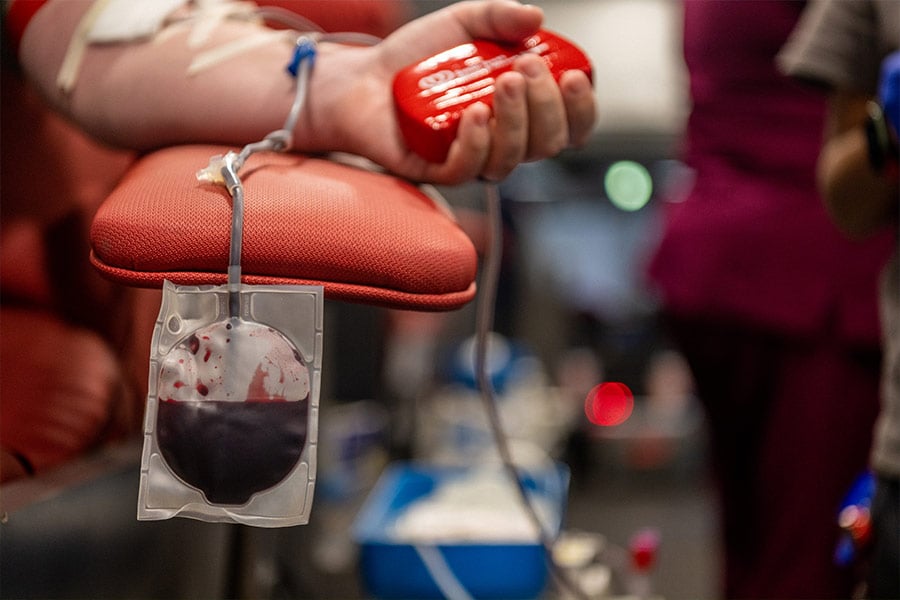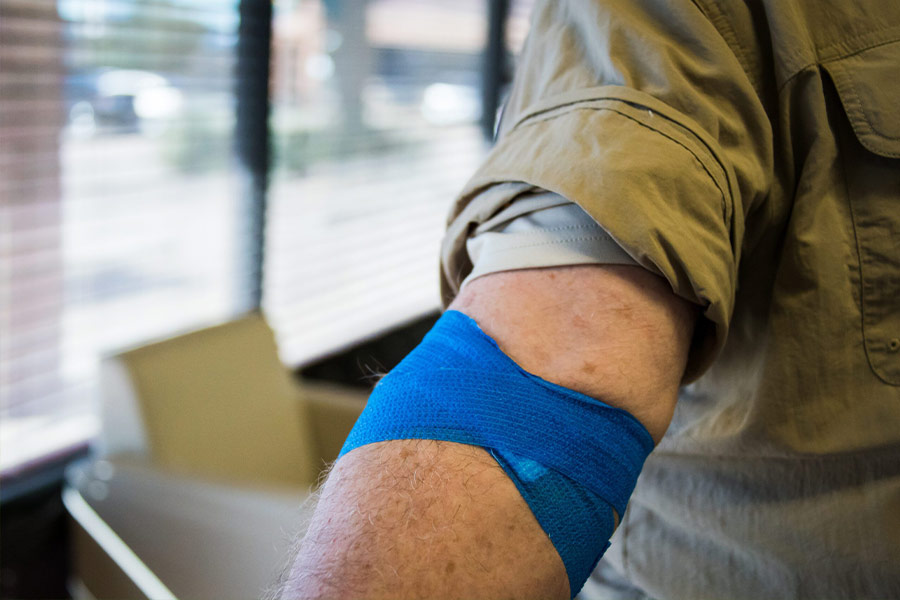Fort Worth Diocese saves lives through blood donations

Community member Kara Lands, 39, donates blood at the South Texas Blood Bank's emergency blood drive on May 25, 2022 in Uvalde, Texas. The South Texas Blood Bank held an emergency blood drive for victims of the Uvalde school shooting. According to reports, during the mass shooting, 19 students and 2 adults were killed, with the gunman fatally shot by law enforcement. (Photo by Brandon Bell/Getty Images)
FORT WORTH — Through blood drives with Carter BloodCare, Catholics in the Diocese of Fort Worth have contributed significantly toward the nonstop need for available blood supply in local communities.
Over the course of 2021, North Texas Catholics donated about 1,745 pints of blood, according to Carter BloodCare. The number does not include the number of Catholics who donated blood independently.
That number is especially impressive when you factor in the fact that each pint can save up to three lives.
Father Luis Gerardo Arraiza, OFM Cap., pastor at Our Lady of Guadalupe Church in Fort Worth, has personally donated more than 130 gallons of platelets — or 1,040 pints — through Carter BloodCare.
“When I was growing up in the Basque country of Spain, especially in the province where I grew up, which is called Navarre, [giving blood] was part of the culture,” he said.
He started donating blood as soon as he turned 18. When he immigrated to America, he continued to regularly give blood.
Fr. Arraiza shared this practice with his new church community in Fort Worth. Not only does he host four blood drives a year at his parish, but he goes through the 1-to-2-hour process of donating platelets every other week.
“The main reason to donate, for Christians and non-Christians alike, is that [blood] is something that most of us have in abundance,” Fr. Arraiza said. “And there are so many people that have a need for something that we have plenty of. So to me, it’s a no-brainer.”
Colleen Horan, a sales consultant at Carter BloodCare and parishioner at St. Elizabeth Ann Seton in Keller, said the majority of the parishes in the Fort Worth diocese donate blood to Carter BloodCare.
“Catholic Churches are really good about hosting blood drives,” Horan said. “They get it.”
According to Carter BloodCare, a blood transfusion occurs every two seconds in the U.S. Transfusions are the second most common procedure performed in U.S. hospitals among patients over the age of 64. And they are the fifth most common procedure for patients aged 45 to 64.
As one of the largest community blood centers in Texas, Carter BloodCare needs to see between 1,000 and 1,500 donors every day, seven days a week, to keep up with the demand for blood in the 50 counties it serves in North, Central, and East Texas.
Summertime sees a drop in donations as high school students and faculty go on break. The demand for blood, plasma, and platelets, on the other hand, never ceases.
Blood and plasma donations are especially vital in times of grave need, according to the nonprofit.
The recent mass shooting in Uvalde is a prime example.

A bandaged arm after a blood donation. (courtesy photo/Carter BloodCare)
While most blood collected goes to local hospitals, Carter BloodCare is part of an organization called Blood Emergency Readiness Corps.
“Blood banks all over the country work together,” Horan said.
Each blood bank has one week roughly every month in which they are “on call.”
It just so happened that the week of the Uvalde shooting, Carter BloodCare was on call and ready to serve.
“So what that means is that we take blood and set it aside,” Horan explained. “It isn’t sent to local hospitals. This is blood set aside specifically for emergencies like tornados or mass shootings where there are many casualties. The blood is sent where it’s needed.”
Donating blood can help people in need, whether it’s for tragedies like the Uvalde shooting or for local community members who require blood for age-related health issues, cancer, difficult childbirths, anemia, and a variety of other reasons.
All blood types are needed, but O negative blood is particularly in demand due to its versatility.
Fr. Arraiza hopes that some of the myths surrounding donating blood — such as Catholics aren’t supposed to or that it will make the donor gain weight — will soon fade.
“You have. Someone else doesn’t. There is a surplus, so you need to take care of those who are in need. End of the story; it is that simple. It’s something that truly, truly saves lives,” Fr. Arraiza emphasized.
As of June 14, 857 pints of blood have been given through Fort Worth diocesan parish blood drives in 2022, according to Horan.
If you would like to donate blood, please see CarterBloodCare.org or ask your pastor about your parish’s participation in blood drives.
